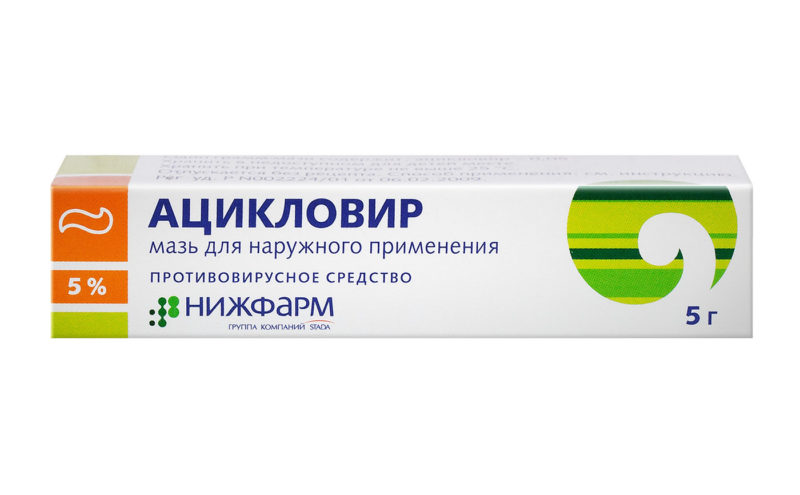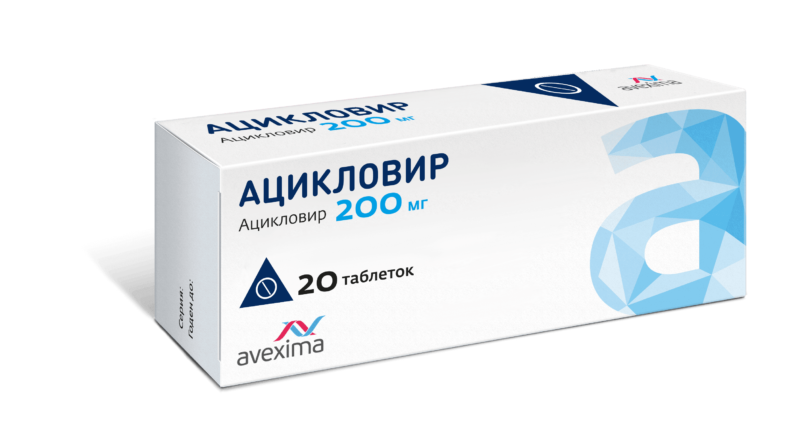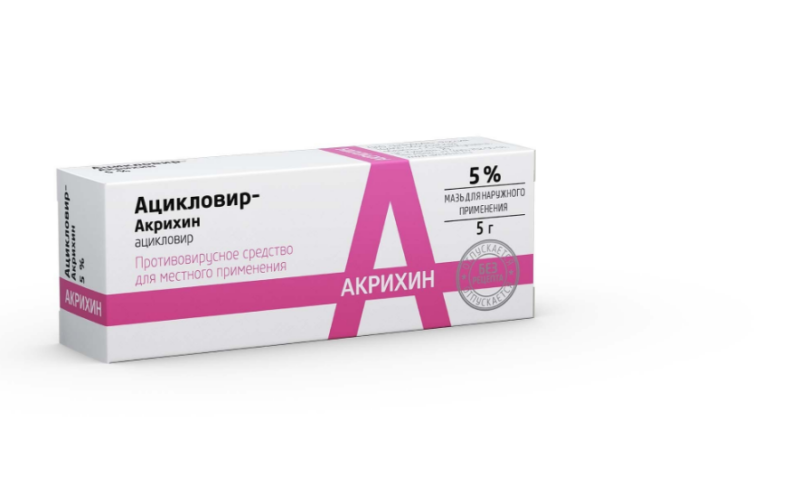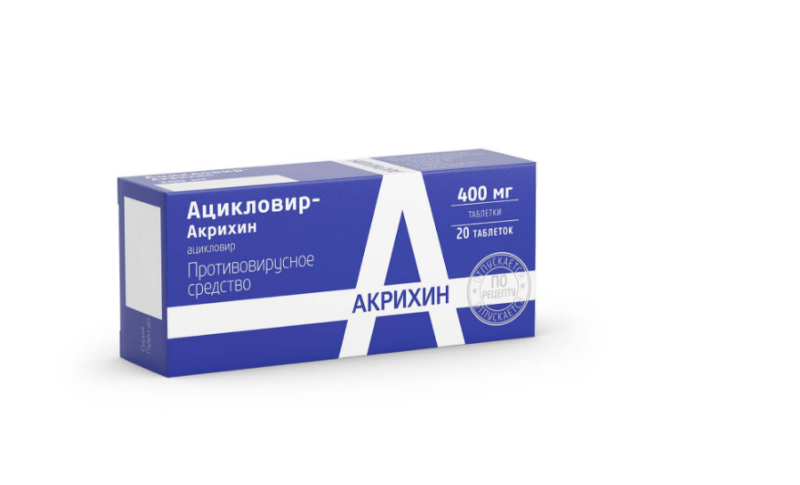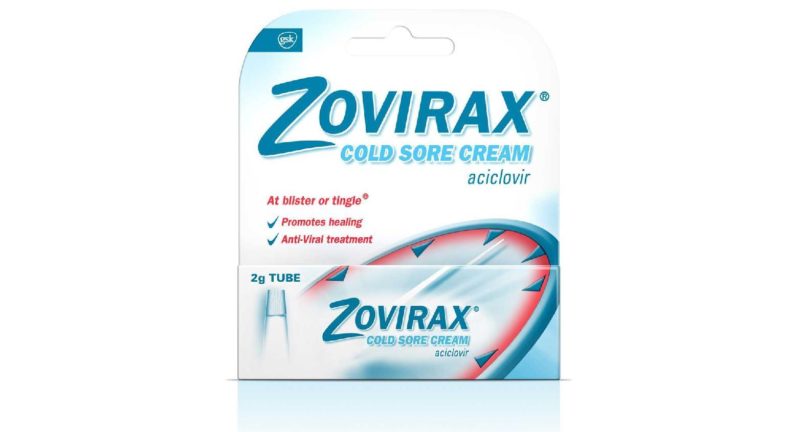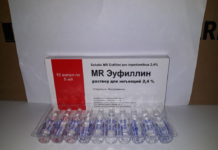Acyclovir is a modern antiviral drug that has been shown to be highly effective in the fight against the herpes virus (herpes). The active substance destructively affects the pathogen, preventing its further reproduction. In exceptional cases, “Acyclovir” may be prescribed during pregnancy.
Material Content:
Composition and release forms
The antiviral drug Acyclovir is available in the following forms:
- eye ointment 3%;
- cream for local use 5%;
- 400 mg tablets, 200 mg;
- powder for the manufacture of an injection solution.
All forms of "Acyclovir" contain the common active substance acyclovir. In addition to the main component, the preparation contains auxiliary ingredients.
So, the external cream contains:
- petroleum jelly;
- cetostearyl alcohol;
- purified water;
- propylene glycol.
In tablets are present:
- calcium;
- talc;
- silica;
- collidone.
In the powder for the manufacture of an injection solution, only sodium chloride is present as an auxiliary component.
Why is Acyclovir prescribed during pregnancy?
If the herpes virus once enters the body, then it remains there until the end of life. A strong immune system produces antibodies to it, and thanks to this, herpes is not able to multiply freely.Then, being in the latent phase, he expects a decrease in immunity when he gets the opportunity to attack the body. As you know, the period of pregnancy is characterized by a decrease in the defenses of the woman’s body, and therefore this condition is most convenient for activating herpes.
In the case when infection with herpes occurred before pregnancy, the body of the woman develops antibodies that help protect the fetus from infection. If the infection occurred after conception, then “Acyclovir” is prescribed to pregnant women to prevent serious complications for the fetus.
In obstetric practice, drinking “Acyclovir” during pregnancy is often offered. This antiviral drug is capable of deleterious effects on different types of herpes. Against the background of his intake, there comes a cure of herpes zoster, genital herpes, chickenpox.
Important! The active substance "Acyclovir" in tablets easily bypasses the placental barrier, entering the body of the child. However, during the treatment with this drug, the development of intrauterine pathologies that could have formed against the background of infection with herpes was not revealed.
Doctors say herpes exposure is far more dangerous than Acyclovir. The virus negatively affects the formation of all organs and systems of the fetus, during pregnancy. During infection, a miscarriage, a missed pregnancy, and premature birth can occur.
The purpose of the discussed tool is to prevent the formation of herpes of a neonatal appearance, and is also relevant for:
- frequent relapses of herpes on the lips, in the eye area;
- frequently recurring genital herpes;
- keratitis of herpetic nature;
- encephalitis;
- bacterial pneumonia;
- chicken pox.
Nevertheless, “Acyclovir” should be taken with caution during pregnancy and only after the appointment of a doctor who assessed the condition and history of the woman.
Instructions for use at different times
"Acyclovir" refers to antiviral drugs, has a wide spectrum of action. Against the background of treatment with this medication, the protective functions of the body are activated.
The most common during pregnancy was the ointment "Acyclovir", which processes the skin. Use of lyophilisate for droppers for women expecting a baby is prohibited. If herpes has affected the mucous membrane of the eye, it is recommended to apply an eye ointment containing acyclovir.
200 mg tablets
If necessary, women are prescribed Acyclovir 200 mg tablets in the third trimester. Drinking this antiviral agent in early pregnancy should not be, since it is during this period that the organs and systems of the fetus are laid.
It is recommended to drink tablets at the same time as eating, with clean water. Dosage and treatment are selected individually, based on the duration of pregnancy, the area of damage, the frequency of relapse, the general condition of the woman’s immune system.
Typically, an appointment is made as follows:
- with primary herpes on the genitals, it is indicated to drink 200 mg up to 5 times a day, the course of treatment in this case lasts from 7 to 10 days;
- with relapses of herpes on the genitals, it is allowed to take up to 3 times a day, 400 mg from 3 to 5 days;
- with suppressive genital herpes, it is prescribed to drink 400 mg 2 times a day for 5 days;
- with chickenpox, the dosage is increased to 800 mg four times a day, treatment lasts about 5 days;
- with shingles it is indicated to drink the drug 5 times a day for 800 mg, the course of treatment varies from 7 to 10 days.
On a note. To avoid dehydration during treatment with Acyclovir, a large volume of water is indicated.
Ointment
At any stage of pregnancy, the use of Acyclovir ointment is possible, since its active substance penetrates into the bloodstream in a minimal amount and does not have a detrimental effect on the fetus.Typically, a topical agent is applied to the area affected by herpes up to 5 times per day. To get the best result, it is important to carry out the procedures at intervals of exactly 4 hours.
The ointment should be applied without rubbing into the skin affected by herpetic eruptions. This is the only way to avoid the transfer of infection to neighboring areas of the skin. The usual therapeutic course lasts at least a week. Sometimes it may increase. Treatment of the affected area is carried out until the complete disappearance of painful blisters.
Drug interaction
Usually, “Acyclovir” is combined with other drugs.
But it should be used with caution in conjunction with the listed medicines:
- with immunostimulants - it is possible to strengthen their action;
- with antibacterial - the number of side effects from the urinary system increases.
Pregnant women need to inform the doctor who prescribes "Acyclovir" about any drugs that are already taken at the moment.
How an antiviral drug affects the fetus
Treatment with “Acyclovir” is less dangerous for a child’s unformed organism than exposure to the herpes virus, which can lead to the development of many intrauterine defects.
- In the early stages of pregnancy, it is preferable to use the drug in the form of an ointment, since in this case the active substance does not penetrate the woman’s circulatory system and enters the fetus in a minimal amount. This minimizes the likelihood of developing congenital malformations.
Note. During treatment of pregnant women with “Acyclovir”, the negative effect of the active substance on the fetus has not yet been diagnosed.
- In the second trimester, it is also most preferable to use the drug in the form of an ointment. Tablets are allowed to be taken only in exceptional cases, when the risk of harmful effects of the virus on the fetus increases.
- At the end of pregnancy, it is urgent to stop the spread of the herpes virus in the body of a pregnant woman in order to avoid infection of the child during the birth period. At this time, it is allowed to use both ointment and tablets.
Contraindications, side effects and overdose
"Acyclovir" is not indicated for use in the following conditions:
- intolerance to the active component;
- dehydration of a woman's body;
- renal failure;
- brain injuries.
If the treatment of herpes is necessary for lactating women, then breastfeeding should be stopped, since the drug enters the child's body through breast milk and can harm the baby.
The manifestation of side effects during treatment with “Acyclovir” is extremely rare.
However, the following reactions may develop:
- pain in the stomach;
- sleep disturbance;
- disability;
- loss of appetite;
- increased white blood cell count;
- dry skin;
- itchy skin;
- redness of the treated area.
If such conditions occur, discontinue treatment with Acyclovir and seek medical advice. Overdose during the use of the dosage form for local exposure is not observed. With the oral use of the drug, a convulsive syndrome may occur, in extreme situations - coma.
Analogs of Acyclovir
If for some reason it is not possible to take “Acyclovir” for pregnant women, then it is replaced with analogues.
Typically, the following medications are recommended for these purposes:
- Zovirax is used only in cases of serious damage;
- "Herpevir" is approved for use from the beginning of pregnancy;
- "Acyclostad" is used for acute indications and after consulting a doctor;
- Panavir is used only after 16 weeks of gestation.
Selection of analogues of “Acyclovir” during pregnancy should be handled exclusively by a specialist who observes the woman to prevent the negative effects of drugs on the body of the future mother and fetus.
The appointment of "Acyclovir" according to the testimony of a pregnant woman avoids many intrauterine pathologies and give birth to a healthy baby on time.



